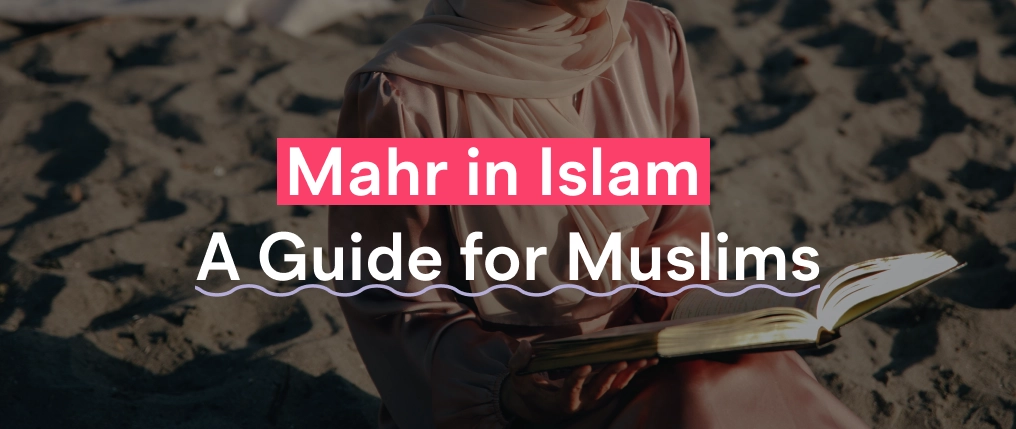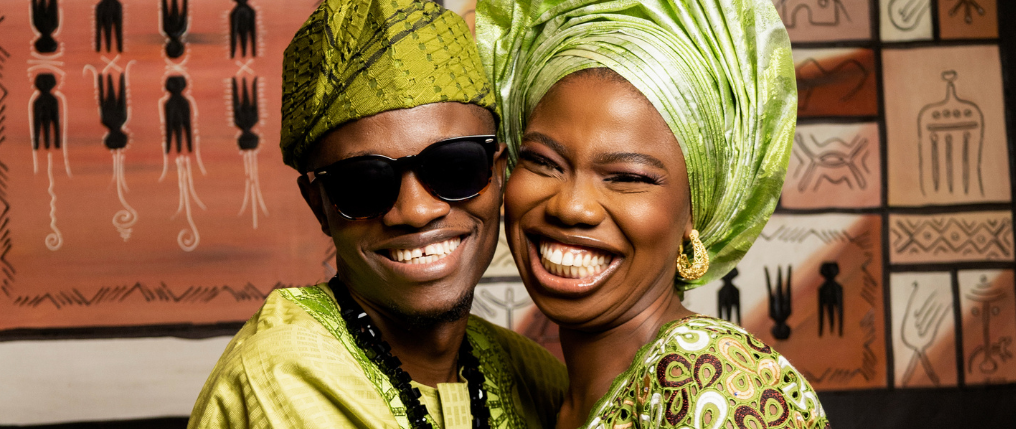
Mahr in Islam – A Guide for Muslims
November 8, 2023

Finding the perfect Mahr in Islam is a big deal. It’s all about love, respect, and commitment in your marriage. But, how do you pick the right one, and why is it so important?


Looking for your soulmate?
You won’t find your soulmate on this blog post but you might find them on Muzz - the world’s biggest Muslim dating and marriage app.
Don’t worry, we’re here to help! In this guide, we’ll navigate the intricate process of selecting the right Mahr, one that not only aligns with Islamic principles but also reflects your mutual affection and financial realities.
So, let’s get started, shall we?
Table of contents:
What is the purpose of Mahr in Islam?
Does a woman have to pay Mahr back?
Can your wife ask for Mahr every year?
How to calculate Mahr in Islam?
What happens if you don’t pay Mahr?
What is Mahr in Islam?

Mahr in Islam is a significant concept, and it’s essentially the bridal gift given by the groom to the bride as a token of his love and commitment. It’s a fundamental part of Islamic marriage contracts and holds great symbolic and practical importance.
Related content: The complete guide to a Muslim wedding
In Islam, it’s not just a formality; it’s a legal requirement. The Mahr represents the husband’s responsibility to provide for his wife and serves as a form of financial security for her. It can be anything of value, whether it’s money, property, jewelry, or even something as simple as a heartfelt promise of future support.
Related content: What to expect at an African wedding as a first-time guest
The important thing is that it’s decided mutually between the bride and groom or their guardians before the marriage contract is signed. This ensures transparency and that the wife’s rights are protected.
What is the purpose of Mahr in Islam?

The purpose of Mahr in Islam is deeply significant. It serves multiple essential roles within the framework of a Muslim marriage:
1. Symbol of Commitment: Mahr represents the groom’s commitment to providing for his wife. It’s a tangible symbol of his responsibility and care for her.
2. Financial Security: Mahr acts as a form of financial security for the wife. In case of divorce or the husband’s passing, she has this financial asset to support herself.
Related content: What happens at an Arabic wedding
3. Respect for the Bride: Giving Mahr is a way of showing respect and honour to the bride. It acknowledges her worth and value in the marriage.
4. Transparency and Consent: The process of deciding the Mahr amount involves mutual agreement and transparency. This ensures that the bride’s rights are protected, and she willingly accepts the terms.
5. Legal Requirement: In Islamic law, Mahr is a fundamental part of the marriage contract. A marriage is considered incomplete without it.
Related content: Everything you need to know about Nikkah
6. Differentiating Islam from Cultural Practices: Mahr distinguishes Islamic marriage from cultural practices like dowry. It emphasizes the importance of fairness, consent, and mutual respect in the union.
Is Mahr compulsory in Islam?

Yes, Mahr is indeed compulsory in Islam. It’s a fundamental and essential component of an Islamic marriage contract. In Islamic law, a marriage is not considered valid without the inclusion of Mahr.
Related content: 6 Egyptian wedding traditions worth knowing about
This is to ensure that the rights and financial security of the wife are protected, and it reflects the husband’s commitment to provide for his wife.
Does a woman have to pay Mahr back?

No, in Islam, a woman does not have to pay the Mahr back. The Mahr is a gift from the groom to the bride, and it is her exclusive property. She does not need to repay it under any circumstances, whether the marriage ends due to divorce or any other reason. It’s her right to keep and use the Mahr as she sees fit.
Can your wife ask for Mahr every year?

In Islam, once the Mahr is specified and given, it’s not a practice for the wife to ask for it repeatedly on an annual basis. The Mahr is a one-time gift symbolizing the husband’s commitment to provide for his wife and her financial security within the marriage.
Related content: Tunisian wedding: 7 days and nights of beautiful traditions
It is her right, but it is not customary for the wife to request it annually. If there are any additional financial arrangements, they should be made separately and mutually agreed upon.
How to calculate Mahr in Islam?

Calculating the Mahr in Islam is an important aspect of the marriage process, and it should be done with mutual agreement and clarity. Here’s a straightforward guide on how to calculate Mahr:
1. Mutual Agreement: The amount or nature of the Mahr should be mutually agreed upon between the bride and groom. It’s a matter of consensus and should be decided with the bride’s full consent.
2. Consideration: The Mahr can be anything of value – money, jewellery, property, or even non-material things like services or promises of support. The value should be agreed upon and specified in clear terms.
Related content: 7 traditions to know before attending a Lebanese wedding
3. Affordability: The groom should choose a Mahr that is within his means and financial capacity. It should not cause any financial hardship. Islam encourages moderation in all aspects of life, including Mahr.
4. Transparency: It’s important to specify the Mahr clearly in the marriage contract (Nikah). This ensures that both parties understand and agree to the terms.
Related content: The ultimate guide to preparing for a Nikah ceremony
5. Payment: The Mahr can be paid immediately, in instalments, or even deferred until a specific event, like divorce or the death of the husband. The timing should also be clearly stated in the marriage contract.
6. Gift of Love: Remember that the Mahr is not a price tag on the bride; it’s a symbol of love, commitment, and financial security. It should be given with love and respect.
Related content: Algerian wedding: 8 traditions you don’t want to miss
7. Review Local Laws: Be aware of any legal requirements or customs in your region. Different countries and cultures may have their own rules regarding the calculation and payment of Mahr.
What happens if you don’t pay Mahr?

Not paying the Mahr in Islam is a breach of an essential component of the marriage contract. Here’s what can happen if the Mahr is not paid:
1. Incomplete Marriage: In Islamic law, a marriage is considered incomplete if the Mahr is not specified or not paid. This means that, from a religious perspective, the marriage may not be valid.
2. Legal Consequences: In some countries, not fulfilling the Mahr obligation can have legal consequences, as it’s part of the marriage contract. It can affect issues related to divorce and inheritance, and it might lead to legal disputes.
Related content: How to prepare a Moroccan wedding
3. Moral and Ethical Obligation: Beyond the legal and religious aspects, not paying the Mahr reflects poorly on the husband’s commitment and responsibilities in the marriage. It can create marital discord and harm the relationship.
To avoid these issues, it’s crucial to take the Mahr obligation seriously, agree upon it mutually, and ensure that the terms are met as specified in the marriage contract. This upholds the rights and dignity of both the bride and groom in an Islamic marriage.
Mahr vs Dowry

Mahr and dowry are two very different things, and it’s crucial to understand the distinction.
Mahr, as we just discussed, is the amount or gift that the groom gives to the bride as part of the Islamic marriage contract. It’s a symbol of love and financial security, and it belongs solely to the bride. It’s given willingly by the groom to honor and support his wife.
Related content: Attending a Henna Party as a Guest? Here’s Your Essential Guide
Now, let’s talk about dowry. Dowry is a practice in some cultures where the bride’s family gives money, gifts, or property to the groom or his family as a condition for the marriage. This is quite different from Mahr.
The key differences are:
- Direction of Giving: Mahr is given by the groom to the bride, while the dowry involves the bride’s family giving to the groom.
- Purpose: Mahr is a symbol of love, respect, and financial support for the wife, whereas dowry is often seen as a financial transaction or incentive for the groom and his family.
- Ownership: Mahr belongs to the bride and is hers to keep and use as she pleases. Dowry, on the other hand, often becomes the property of the groom and his family.
- Islamic Perspective: Mahr is an essential and highly recommended component of an Islamic marriage, while dowry is not a part of Islamic teachings and is considered a cultural practice.
Conclusion
As we conclude this guide on choosing the perfect Mahr in Islam, remember that this process is not just about a financial transaction; it’s a symbol of love, care, and security in your marriage. It’s about upholding the principles of mutual respect and commitment.
Related content: Exploring Walima: A detailed overview and guide
The best Mahr is one that aligns with your financial means, respects the bride’s desires, and reflects the spirit of Islamic teachings. By being transparent, flexible, and thoughtful in your choices, you can ensure that the Mahr you select is a beautiful representation of your devotion to one another.

